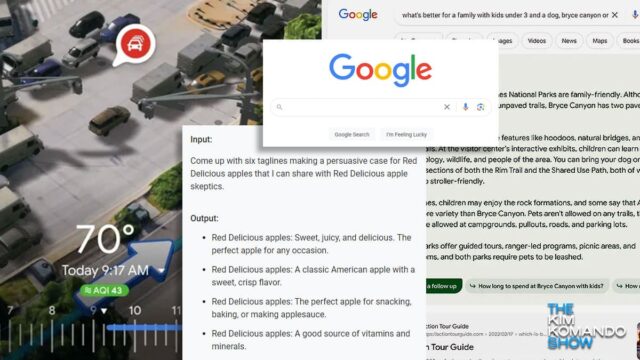Google is doubling down on AI across its services

The artificial intelligence (AI) wars are heating up as Google tries to play catch-up with OpenAI’s ChatGPT, which is now being used by many tech companies to improve their services.
Judging by the mishaps we’ve already seen, the Alphabet company has a long way to go. Google has had AI capability baked into its products for some time (including better translation quality in Google Translate), but generative AI will take things to a new level.
Help me write
The world’s most popular email service already has autofill options to help you finish sentences, but now it can do much more. Let’s say you need to request a refund or get out of a party you really don’t want to attend. Just enter a prompt of what you need and hit create.
Gmail will compose a message using information from previous messages in your inbox. You can adjust the length of the email and the tone (use formal for work and casual for friends). Make any other changes as you see fit and fire away when ready!
Know before you go
Did you know that Google Maps Street View owes its existence to AI? How else could billions of images be stitched together to give you that first-person perspective?
Immersive View kicked things up a notch with 3D views of select locations worldwide. Now you can combine that experience with your route to better understand the area.
Want to take a bike ride by the water but can’t decide where to begin? How about checking the conditions before setting out on that summer road trip? Now you can see the sights, weather, traffic and air quality before heading out.
Immersive View for routes will roll out over the summer and launch in 15 cities by the end of the year, including London, New York, Tokyo and San Francisco.
Photo magic
I hope you had a good Mother’s Day and took lots of photos. But wait — the one time you were able to get the whole family to stand still for one produces a pic rife with problems.
The balloons got cut off, your husband is standing too far away from the group and your nephew’s t-shirt is emblazoned with a dirty word. Magic Editor can recreate the balloons, move your husband to a better spot and remove the offending message from that shirt.
Magic Editor for Google Photos will roll out later this year.
Bard gets smarter
Google’s first counter to ChatGPT was Bard, and it was a mess. The company uploaded a video ad in which Bard was asked a simple astronomy question— which it got wrong.
Bard is getting improvements in hopes of winning you back. Enter a prompt and you’ll get visual responses in addition to text. Ask Bard for the best sights in Rome and you’ll get pictures of the Coliseum, Forum and Trevi Fountain, alongside descriptions.
And get this. Upload a photo to Bard and the AI will analyze the image using Google Lens and create a caption or description. Google’s removed the waitlist for Bard and it’s available to over 180 countries and territories — with more coming soon.
RELATED: Jobs that ChatGPT has already eliminated
Save time with Search
The world’s most popular search engine is incorporating generative AI to reduce how many searches you’ll need. Let’s say you’re planning a trip but unsure where to go. Ask Google something like, “What’s the best place to take three young children for five days?”
You’ll get itineraries with destinations, restaurants, activities and hotel recommendations — all with just one search. Want to try out the new Search before it goes public? You can sign up here.
NOTE: It’s not available to everyone yet. You might get a notice saying it’s not available for your account right now but keep checking back, as it’ll be available soon.
Spot the fakes
It’s hard to trust anything you see online these days. Is that image real or photoshopped? Is it an old or unrelated photo taken out of context for someone’s agenda?
AI-generated images are everywhere — in social media, stock photography and even political ads. And while this can be entertaining (dogs playing golf on the moon), it can also be used to spread misinformation.
Google is using watermarking and metadata so you can quickly identify images that come from AI. Creators will also have access to these tools, so any image you come across will have the information you need to see where it came from.
In the coming months, Google will add an About this image tool in Google Search. This will provide helpful contexts such as when and where similar images may have first appeared and where else it’s been seen online, including news, fact-checking and social sites.
Later this year, About this image, will be available in Chrome and Google Lens.
Keep reading
Steve Jobs’ uncashed check, ChatGPT job heist & dead phone hacks
The top tactics hackers use to break into your system – And how to stay safe
Tags: AI (artificial intelligence), autofill, email service, generated images, Gmail, Google, Google Gemini, Google Lens, Google Maps, Google Photos, Google Translate, hackers, metadata, misinformation, routes, Search, search engine, Street View
